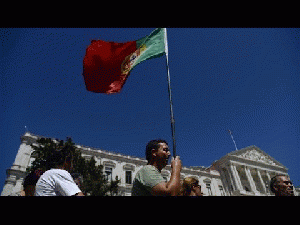Reprinted from Dispatches From The Edge
After several weeks of political brinkmanship, Portugal's rightwing president, Anibal Cavaco Silva, finally backed off from his refusal to appoint the leader of a victorious left coalition as prime minister and accept the outcome of the Oct. 4 national elections. Silva's stand down has ushered in an interesting coalition that may have continent-wide ramifications.
Portugal's elections saw three left parties -- the Socialist Party, the Left Bloc, and the Communist/Green Alliance take 62 percent of the vote and end the rightwing Forward Portugal Party's majority in the 230-seat parliament. Forward Portugal is made up of the Social Democratic Party and the Popular Party.
Even though Forward Portugal lost the election -- it emerged the largest party, but garnered only 38 percent of the votes -- Silva allowed its leader, former Prime Minister Passos Coelho, to form a government. That maneuver lasted just 11 days. When Coelho introduced a budget loaded with austerity measures and privatization schemes, the left alliance voted it down, forcing the government to resign.
Rather than giving the left alliance a chance to form a government, however, Silva -- a former leader of the Social Democrats -- insisted that the alliance pledge in writing that it would maintain the country's role in NATO and commit itself to euro zone financial rules. Portugal is a member of the 19-country euro zone, those countries in the 28-member European Union that use the euro as a common currency.
Silva's threat was real. While the president's term only runs until January, the constitution requires a six-month delay between the appointment of a new president and fresh elections. It would have been eight months before the left alliance could take power and roll back some of the more onerous austerity measures that Forward Portugal had installed.
In the face of growing outrage and a threatened general strike, however, Silva finally asked Socialist Party leader Antonio Costa to form a government.
Portugal is the victim of the great 2008 international banking crisis. At the time, Portugal's debt was small and its public spending modest, but speculators drove up the price of borrowing beyond what the country's small economy could manage. Through no fault of its own, Portugal suddenly found itself on the edge of bankruptcy.
In 2011, the "Troika" -- the European Central Bank, the European Commission, and the International Monetary Fund -- lent Portugal $83 billion, but in exchange instituted an austerity regime that raised taxes, slashed education and medical care, cut wages and pensions, and drove 20 percent of the population below the poverty line. The crisis forced almost half a million young people to emigrate, and Portugal ended up with one of the highest income disparities in Europe.
(Note: You can view every article as one long page if you sign up as an Advocate Member, or higher).






